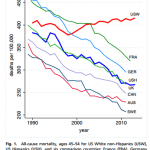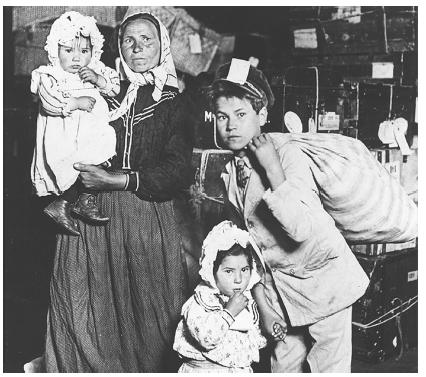When I wrote my post the other day suggesting that Rubio give a Big Policy Speech on immigration, and make some commitments to the GOP Base, I hadn’t dug into the specifics of Rubio’s backtracking from amnesty. And I hadn’t realized how weak Rubio’s current position is.
Here’s an article from Breitbart (actually from April but with renewed notice on twitter), on an interview Rubio gave, in which he says that, assuming the “DAPA” amnesty (that is, the executive order granting work permits to illegal immigrants with children living in the U.S.) continues to be stalled by the courts, he would cancel it outright upon taking office, but he would continue the “DACA” amnesty (for individuals who arrived in the U.S. as minors) for a certain undefined length of time and/or until a broader amnesty is passed (he’s not clear on this), because it will have been long enough since the program was initiated that large numbers of young people would have their lives disrupted.
But what stunned me was this: the sole reason he gives for his new gradualist position on immigration is this: it was politically unfeasible to achieve all his goals in one piece of legislation. Here’s what he said in the Univision interview being quoted:
I do think that if I wind up being president, it will be possible to achieve new immigration reform. It won’t be possible for it to be comprehensive; that is, they are not going to be able to do everything in one massive bill. We already tried that a couple of years ago. We have seen that the political support isn’t there, and I think we’ve spent a lot of time on this process when we could have started moving forward through the three steps that I advocated. Unfortunately, a lot of time has been wasted on that. It has become an even more controversial issue; harder to move forward on that issue. But I still say that it’s important to modernize our system, and that means improving the way we enforce it in the future, to modernize the immigration system so that it’s not so costly and bureaucratic. And we have to deal with 12 million human beings who are already here. And nobody, nobody is advocating a plan to deport 12 million human beings. So that issue has to be dealt with, as well.
Ramos: When you announced your candidacy, outside of the building where you announced it, there were a lot of Dreamers, protesting. And then there are some immigrant organizations that have criticized your candidacy. America’s Voice says that you have anti-immigrant positions. I would like to ask you, you were in favor of an immigration reform bill in the Senate, and you voted for it. But today, would you vote in favor of a path to legalization for 11 million undocumented people?
Rubio: Well, that can’t be done today for the following reason. I don’t think we can. I have been very clear. I, through that two-year experience, it’s very clear to me. We’re not going to have the votes or the necessary political support in Congress. Today, in some sectors of the American public, in order to move forward on this issue, unless we first prove to the American people that in the future there’s not going to be another immigration crisis. If we do that, I think that undoubtedly the political support is going to exist to do legalization as you have said. It has to be a process similar to what we advocated in the legislation that I sponsored, and it’s the law that says that, first, the things we’re all familiar with must be present: a background check, pay a fine, begin to pay taxes, get a work permit, and after 10 years, they can apply for their residency. That would be the process, but we can’t get to that point. Politically, the support and the votes in Congress aren’t there until we prove to those members of Congress and the American people that immigration laws are going to be enforced.
So here’s the key: when asked, “would you vote for legalization?” he doesn’t say “yes.” He doesn’t say “no.” He says, “that can’t be done.” But he sure as heck seems to suggest that if, at any point, he thought he had the votes, he’d do so. Now, he’s running for president, not re-election to the Senate, so the question is really two-fold: would he sign legislation similar to the Gang of 8 bill (that is, in which enforcement is window-dressing, rather than substantive), if it made it’s way through Congress? And would he use political capital trying to move such a bill through Congress, cajoling reluctant Congressmen and Senators, offering goodies such as special funds for displaced workers or additional funds for social services in a given district as “demonstration projects”?
After all, Rubio does not reject anything except the politics and optics of his prior attempt. He doesn’t even try to pretend to claim that he’s recognized the folly of his prior plan. The only problem, he says, is that the American people that weren’t ready for this.
As a reminder: the Gang of 8 bill provided immediate legalization for all illegal immigrants except for hardened criminals. The conditions set forth were really very minimal: “paying taxes” generally meant “begin to collect tax refunds”, for instance. The statement that there’d be a 10 year delay while enforcement mechanisms were put in place was fundamentally dishonest, given that there was, really, nothing at risk — the newly-legalized immigrants would have their work visas renewed, with no risk of cancellation, up until that point at which they were able to gain permanent residency. The requirement to learn English was ill-defined, and there were hardship exemptions everywhere you looked. I don’t remember the particulars about the fines, but it seems to me that they weren’t particularly burdensome, given that we’re talking about low-wage earners here. (Yeah, I read the bill in detail but I can’t find the blog post in which I walked through these sections.)
Rubio’s new proposal — to get to the same endpoint via a series of bills — doesn’t strike me as much of an improvement, if “series” is meant to imply that they are all passed within a relatively short time frame. If a bill to implement e-verify is passed, but no effort is made to implement it before the legalization bill is passed — and the latter is implemented immediately — we’re not in any different a place than with the Go8 bill. And Rubio’s repetition of the 10-year delay seems to suggest that it is during this time that the enforcement would be implemented (to the extent that Rubio’s and succeeding administrations choose to do so).
Again: pass enforcement mechanisms first, punishing employers who use illegal immigrant labor, either with false papers or paid under the table. Go after creators and users of forged IDs. Allow employers to question documentation without being hauled up for discrimination. Simultaneously, provide “true amnesty” (rather than mass legalization) in appropriate cases, such as spouses of US citizens, and allow legalization of limited numbers annually, of the most assimilated individuals/families, with strict caps and selectivity, and with intentional caps on total new arrivals from all categories, as well. Require, not sign-off from government agencies, but documentation from credible sources that illegal immigration has been de facto eliminated, plus low unemployment and strong wage growth among low earners, before these small annual caps on legalization are liberalized, but set some basic requirements in any case, rather than allowing even the greenest of new arrivals to stay.
Bottom line: this is why people support Trump (even though his “open door” doesn’t sound much better). They’re tired of these games. And, in the end, of the supposedly-strong GOP bench, who’s left?













